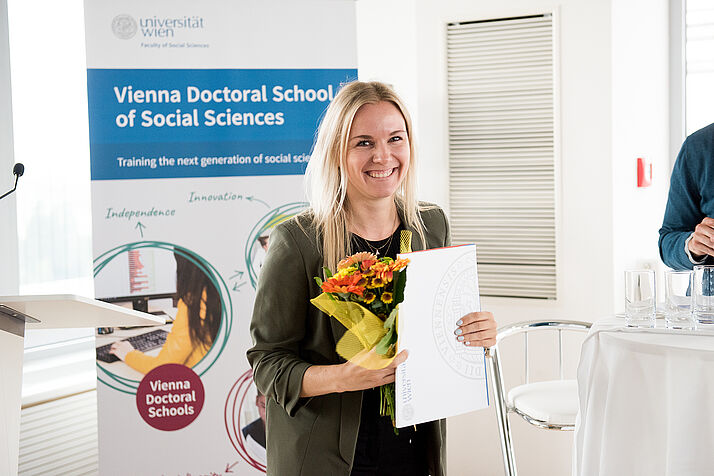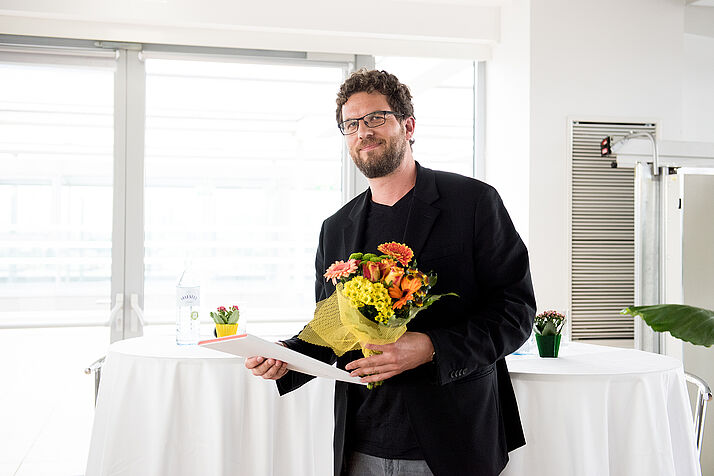sowi:doc Awards 2020
The sowi:doc Awards for the academic year 2019/2020 are awarded to:
Alice Binder
Research field: communication
“The influence of healthy food placements within children’s movies. Persuasive mechanisms and effects”
The dissertation examines the effects of healthy food placements in entertaining audiovisual cartoons on the actual eating behavior of children. Based on one book chapter and four empirical studies, the core results of this dissertation indicate that the use of persuasive strategies in connection with healthy food placements in audiovisual content can have a positive impact on children’s healthy eating behavior. However, this effect depends on a chain of impact factors and varies between the different persuasive strategies and children’s individual and contextual factors. Overall, the dissertation provides valuable information for parents, schools, policy makers and for media professionals to promote healthy eating habits in children.
Alice Binder defended her dissertation in April 2020 at the Faculty of Social Sciences of the University of Vienna. Since April 2020 she works as a postdoctoral researcher at the Department of Communication at the University of Vienna. Her research interests include persuasive communication, advertising effects, health communication and food placement effects on children.
Contact: alice.binder@univie.ac.at
Andreas Kranebitter
Research field: sociology
“Henchmen of the SS or forgotten victims? A contribution to a sociology of concentration camps focusing on the example of the so called 'professional criminals' of the Mauthausen concentration camp”
The dissertation focuses on a group of deportees to Nazi concentration camps which the Nazis had labeled “Berufsverbrecher” (“professional criminals”). Even though this group is a topical issue in cultural-industrial and revisionist discourses, scientific research on it is scarce. By writing a collective biography of the 881 Austrian “Berufsverbrecher” deported to Mauthausen, the dissertation integrates different historical sources as well as scientific approaches, from multivariate statistical analyses to hermeneutical sequential analyses of own interview material with dependants, using concepts from critical criminology and research on violence. Eventually, the results are interpreted within a theoretical framework conceptualizing the camps as permanent exceptional situations (following Giorgio Agamben). Social action under extreme conditions, so the main thesis, was a question of situations and positions within the prisoners’ societies, with nearly no connection to former experiences of delinquency or to the label “Berufsverbrecher”.
Andreas Kranebitter defended his dissertation in January 2020 at the Faculty of Social Sciences of the University of Vienna. Since September 2020 he works as the managing director of the Archive for the History of Sociology in Austria at the University of Graz. His research interests are the History and Theory of Sociology, Research on Violence, Research on National Socialism, and Critical Criminology.
Contact: andreas.kranebitter@uni-graz.az
Julia Carolin Sachseder
Research field: political science
“The coloniality of violence. The intersections of gender, race and transnational capital in the production of violence against women in the Colombian armed conflict”
The dissertation investigates the (persistence) of political violence against women and sets out to make sense of the broader conditions that generate and perpetuate its patterns in the context of the armed conflict in Colombia. Drawing on extensive ethnographic fieldwork in various conflict-ridden areas, it develops the concept of “coloniality of violence” to generate a new understanding of violence as implicated within intersectional power structures that are historically anchored in colonialism and reproduced by the corresponding logics of contemporary capitalism and war.
These conceptual lenses are particularly suitable to studies on other armed conflicts in (post)colonial settings, keen to explore and to further theorize the relationship between political violence, conflict, and the global political economy shaped by colonial legacies. First, it is important to shift analytical attention (in IR and other fields) from conventional notions of “conflict actors” (typically centred on state military forces, paramilitary militias and rebel groups) to other types of actors, including global economic actors (such as transnational corporations, or TNCs). Second, to broaden the often all-too narrow understanding of political violence, we need to attend to the experiences and stories of those individuals and social groups who are most affected from the violence, yet largely remain invisible.
Julia Sachseder defended her thesis in April 2020 at the Faculty of Social Sciences of the University of Vienna. She is a lecturer and researcher at the Department of Political Science. Her research focuses on the political economy of armed conflict and violence, peace and (border) security, gender and race, feminist and decolonial theory.
Contact: julia.sachseder@univie.ac.at
Media reports
- Kolumbien-Forscherin: „Ein Ende der Gewalt gibt es nicht“, derstandard.at, 8 June 2019 (in German)



